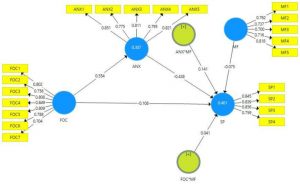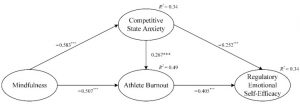Focused and Self-Compassion Meditation Have Different Effects on Attention, Well-Being and Classroom Performance
By John M. de Castro, Ph.D.
“There is no good or bad meditation — there is simply awareness or non-awareness. To begin with, we get distracted a lot. Over time, we get distracted less. Be gentle with your approach, be patient with the mind, and be kind to yourself along the way.” -Andy Puddicombe
Meditation training has been shown to improve attention, health and well-being. One problem with understanding meditation effects is that there are, a wide variety of meditation techniques and it is not known which work best for affecting different psychological areas. Classically they’ve been characterized on a continuum with the degree and type of attentional focus. In focused attention meditation, the individual practices paying attention to a single meditation object. In open monitoring meditation, the individual opens up awareness to everything that’s being experienced including thoughts regardless of its origin. In Self-Compassion meditation the individual wishes the self happiness, well-being, safety, peace, and ease of well-being.
In today’s Research News article “The effects of short interventions of focused-attention vs. self-compassion mindfulness meditation on undergraduate students: Evidence from self-report, classroom performance, and ERPs.” (See summary below or view the full text of the study at: https://www.ncbi.nlm.nih.gov/pmc/articles/PMC9858058/ ) O’Hare and colleagues recruited undergraduate students and had different classes practice focused meditation or Self-Compassion meditation for 10 minutes per week for 10 weeks. Before and after the training the students were measured for course performance, anxiety, worry, mood, positive and negative emotions, stress, self-compassion, and empathy. They were also measured for electroencephalogram (EEG) during performance of a cognitive/attentional task.
They found that both meditation types produced significant reductions in worry while the focused meditation group had less interference effects during the attentional task and self-compassion meditation produced significant reductions in anxiety, perceived stress, and depression, significant increases in positive emotions and course performance, and less reaction in the EEG to negative emotional words.
Hence, focused meditation appears to produce better attentional control while self-compassion meditation produced improved psychological well-being and academic performance. Hence, different meditation techniques produce different benefits for college students.
“To know one’s own mind is nothing short of life-changing. –@Headspace
CMCS – Center for Mindfulness and Contemplative Studies
This and other Contemplative Studies posts are also available on Twitter @MindfulResearch
Study Summary
O’Hare AJ, Gemelli ZT. The effects of short interventions of focused-attention vs. self-compassion mindfulness meditation on undergraduate students: Evidence from self-report, classroom performance, and ERPs. PLoS One. 2023 Jan 20;18(1):e0278826. doi: 10.1371/journal.pone.0278826. PMID: 36662726; PMCID: PMC9858058.
Abstract
Mindfulness-based stress reduction (MBSR) training has been shown to improve cognitive processing, wellbeing, and academic performance. However, mindfulness interventions that are integrated into non-mindfulness related courses have not been well-investigated. Further, the unique effects of different aspects of MBSR training are not as well understood. This paper examines the effects that are uniquely associated with focused-attention versus self-compassion mindfulness practices utilizing a multi-method approach. Event-related potentials (ERPs) were recorded during an Emotional Flanker task, and self-report measures of wellbeing and measures of classroom performance were collected before and after training. Participants were students in two sections of the same undergraduate course and either completed 10 weeks of focused-attention practice or self-compassion practice that was built into their class sessions. Students in the focused-attention group (mean age = 22.08) had reduced interference effects on their reaction times following the training. Students in the self-compassion group (mean age = 23.91) showed altered processing of conflict on negative trials via the N2 and P3 ERP amplitudes after the training. This group also reported significant improvements in wellbeing and performed significantly better on more class tests compared to the focused-attention group. These data support the effectiveness of incorporating brief, simplified mindfulness practices in any classroom as an intervention to improve attention, wellbeing and classroom performance.
https://www.ncbi.nlm.nih.gov/pmc/articles/PMC9858058/









